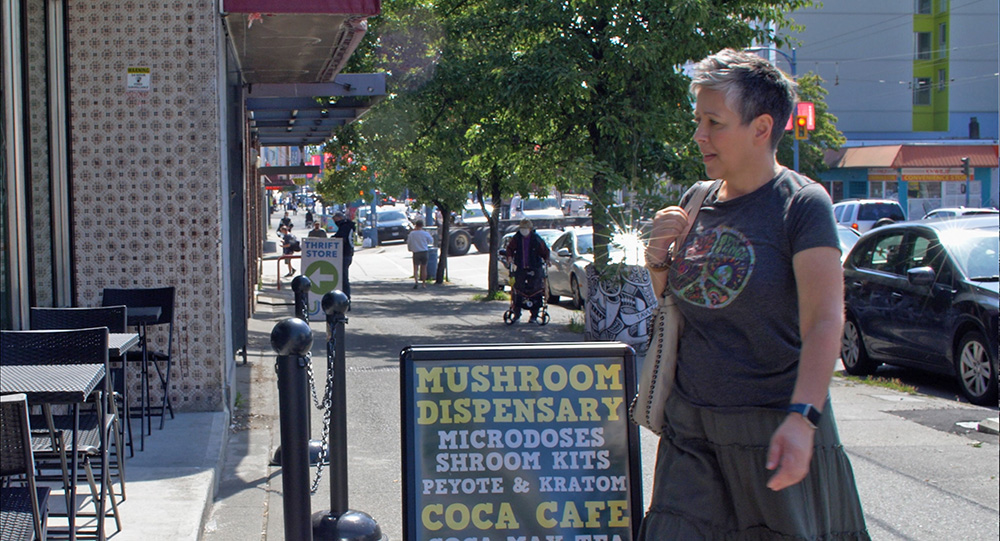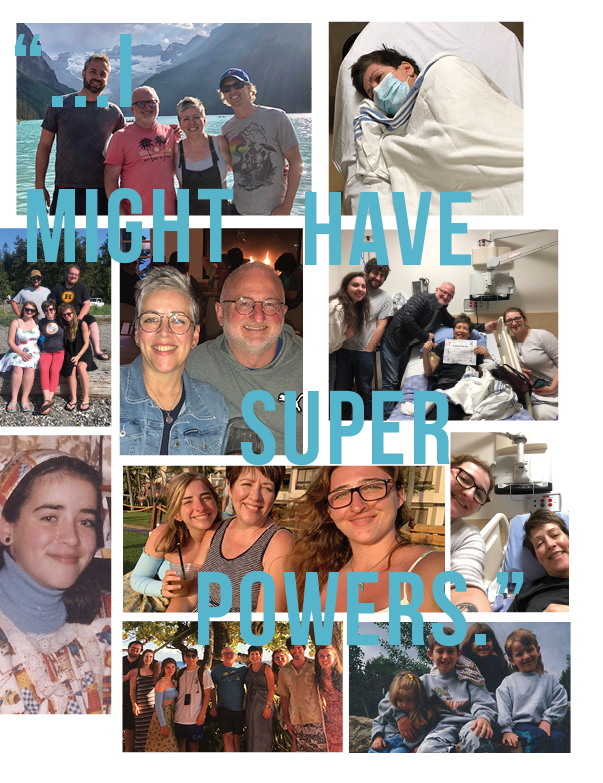Life After DOSED: Beyond the Film With Laurie Brooks
The film DOSED: The Trip of a Lifetime follows Laurie Brooks as she discovers the transformative power of plant medicine. Off-screen, Laurie shares the deeper discovery: her authentic self.
By David Pogge
She sits upright on a non-descript couch, in a nondescript suburban living room. She could be anywhere—and in a sense, she’s been everywhere. The look in her eyes is unmistakably familiar to anyone who’s shared in the experience. It’s the aftermath of a spiritual purging, a tsunami of catharsis wrapped up in revelation. It’s a sensation of such complete and total surrender that you could mistake it for a sort of cheerful nihilism if everything wasn’t pulsating with so much meaning. You could call it a look of resignation, but not of defeat.
“Death is as easy as crossing the street,” she’ll later tell me, describing what she’s learned in this moment.
Her therapist and his assistant sit in armchairs across from her. Glenn, her husband of more than 30 years, is on the couch beside her, his eyes adoringly locked on hers as he hangs on her every word.
“I don’t even know where to start,” she begins, her voice choked with relief. “I’m done. I’m done with the crying. There’s nothing to be sad about anymore.” As if on cue, a tear leaks out of her left eye and slides down her cheek, still flushed crimson by the force of the emotional release. Somehow, that single tear is more proof of her words than a contradiction.

If there’s a climax to be had in the film, DOSED: The Trip of a Lifetime, this is it, though there’s no spoiler within the recounting. If anything, the spoiler is this: Five and a half years after she was diagnosed with colon cancer and told she had less than a year to live, Laurie Brooks is still here—and she’s more alive than ever.
The film, which premiered in 2022 and features an all-star cast of plant medicine luminaries that includes Paul Stamets, Gabor Maté and Dennis McKenna, documents Laurie’s journey as she grapples with her own mortality in the face of a harrowing diagnosis and improbable recovery. A native resident of British Columbia, our protagonist was able to take advantage of Canada’s Special Access Program, which allows terminal patients access to psilocybin therapy on a case-by-case basis. As if to strike the perfect chord, the film also documents her adoption of a cannabis oil regimen to supplement her treatment. The results speak for themselves and have made Laurie, a mother of four and wife of a former evangelical pastor, an unexpected hero of the plant medicine movement.
But for Laurie, as much as the movie has opened doors and created opportunities by which she can make a lasting difference on her terms, it represents what is already behind her. It’s the prologue; the real journey begins now.
“Everybody wants to know about cancer,” she tells me. “And for me . . . I don’t want to think about that anymore. I still have cancer—I still have a tumor, actually. His name is Frank. Frank is a bad boyfriend who just won’t leave. I’ve told him to sit down and shut up and he has. So, I don’t know; I’m just kind of past that now. But we go to screenings for the movie and that’s all people want to know about is the cannabis regimen, or . . . my cancer, and it’s like, you guys are missing the point. The way I got through cancer was by finding myself again—and mushrooms definitely helped me do that.”
The first thing I notice about her as we open the conversation is the electricity of her presence that’s tangible even over a Zoom call. There’s an unforced joy in her voice, an effervescence that seems to punctuate her thoughts, which never seem to lack, nor fail to illuminate a deeper truth. She speaks with clarity and authority, but also with casual ease—and surprising candor.
Cannabis has helped me in so many ways. And not just the anti-cancer properties, but also laughing . . . I entertained myself by thinking of other ways to die that were more entertaining than cancer. My favorite right now is getting hit by a piece of space junk falling from the sky. . . . Cancer is so blasé.”
Laurie Brooks

“Cannabis has helped me in so many ways,” she continues, “and not just the anti-cancer properties, but also laughing . . . I learned to laugh at cancer and my tumor because of when I was high—when I was stoned at night,” she lets out an unforced giggle before continuing. “I entertained myself by thinking of other ways to die that were more entertaining than cancer. My favorite right now is getting hit by a piece of space junk falling from the sky . . . Cancer is so blasé.”
Her laughter is contagious, and I find myself joining her, despite the bleakness of the subject matter. But that’s the thing: For her, there is nothing bleak about it. She’s already faced death; she’s made her peace with it, and she’s still here to tell the tale. I point this out to her and ask her if it makes her feel immortal.
She smiles and gives me an affirming nod. “I feel like I might have superpowers.”
Her cancer now in remission, Laurie is moving forward—heart in the moment, eyes on the future. With the knowledge and acceptance of the fact that her prognosis could change at any time, she’s purposed to live deliberately, embracing her most authentic self without apology.
“I feel so much more myself now,” she confirms, her effusive smile beaming through the monitor, “I’m confident in who I am and not afraid to show it; I’m just being more authentic and letting people see who I am. The feeling of being seen and heard is amazing.”
That authenticity means making the choices that are best for her, despite the expectations of some of the members of her newfound audience. There is a general assumption that the choice between conventional and plant medicine is a binary one, but Laurie doesn’t see the world in ones and zeroes. It was psilocybin therapy—not DMT.
“I haven’t gone off my chemo meds,” she posits with a shrug, “and that’s what people don’t get. I’m not into all this green juice in Mexico or whatever . . . I still work with the doctors—I still have an oncologist that I talk to all the time. I go in for scans and do my chemo regimen, and I’m not going to let that go. These,” she adds, referring to mushrooms and cannabis, “are add-ins. I still believe in science.”
She’s now keeping a blog, dubbed “Laurie’s Place,” in which she documents her continuing journey, as well as the truths she uncovers along the way. The initial posts were spent recounting the story of her cancer battle, but the topic plays little more than a bookend to the experiences she’s had on the other side of that battle, now giving way to discussions of her ongoing personal evolution, with a heavy focus on re-examining the faith of her upbringing. Spoiler alert: Her insights are too big to fit within the four walls of the Church. The next milestone is a book, which she plans to have ready by spring—possibly by the time this issue reaches mailboxes. The book, like the blog before it, has revealed itself to be another growth exercise in its own rite, but the challenge isn’t in finding the words. She has no shortage of thoughts to put to paper. It’s once again about authenticity, which from our conversation, appears to be an enduring theme in her journey.
“It’s almost like labor pains,” she offers, and then with the volume knob ticked up a notch for emphasis, adds, “This is hard. Like, how much am I going to put out there? I actually hired a writing coach who’s helping me with that. She’s telling me, ‘You need to be honest. People will see when you’re pulling back and not being authentic.’”
As if the blog, book, and the speaking engagements aren’t enough to keep her busy, she and Glenn are also in the planning phases of a retreat center for patients with trauma or terminal diagnoses, which will share a moniker with the blog.
Laurie describes the vision with beautiful simplicity: “Come to Laurie’s place and just breathe. Put your hands in the dirt and get connected to the earth again. Take a few days to figure things out and get your feet back under you again. No agenda, no religious teaching… Just come. We’ll tell you our story and be with you in yours.” This isn’t a pipe dream. A close friend who owns a small tree farm has already offered their property and proposed a partnership; phase one should begin before summer. If you’re wondering, psychedelic therapy hasn’t been ruled out, but given the remaining legal ambiguities, it’s not at the forefront of their priorities either. At least, they’re not planning to administer any treatments.
Glenn, who for most of the conversation has been a friendly, but blurry mass in the background, now scoots forward to elaborate on their plans. “We’re not trying to be a psilocybin facility that needs to have all the medical stuff around it,” he qualifies. “What we want to be is a facility that people who have medical exemptions can come and use. We want to be available to them.” The emphasis here is that they intend to follow the rules, whether they agree with those rules or not. And ultimately, where Canada ends up on this topic is yet to be seen.
The interest in psychedelics as therapy has grown exponentially among medical professionals on both sides of the northern border, but neither Laurie nor Glenn seems confident in predicting how or when such treatments will be made widely available.
Laurie drops her answer with blunt exasperation. “I honestly don’t know,” she responds when asked. “I mean, it needs to be legalized because it’s not addictive.” She later comes back with a wry smile and tells me, “I think we should start with our politicians. You can’t be a leader of this country until you’ve done mushrooms. Problem is, if you’re already a shitty person, you might just be a shittier person afterwards.”
“To me,” Glenn adds, “the only way to make it viable for everyone is to get it into our healthcare system. They’re working on that very hard up here. Whenever we speak at one of these film events and people ask us questions, I always tell them that the best way to do this is through a counselor. If you just want to get stoned, whatever. But if you’re looking for actual help, you need to do it with assistance.”
Despite the successes of the limited programs that have been authorized thus far, the Canadian authorities still seem to be dragging their feet—and some are missing the point entirely.
Laurie recounts a conversation with one such official and the frustration in her voice is palpable.
“I talked to a bureaucrat in Ottawa at Health Canada about psilocybin and they told me, ‘Well MAID (Medical Assistance in Dying) is available.’ I’m like, ‘I don’t want to die. That’s the whole point.’ I told him, ‘You’ve given us assistance in dying, which is good. For those who want that, we shouldn’t have to suffer.”
She pauses and takes a breath. Her next words strike at the very heart of the matter and punctuate the discussion with flawless precision.
“But what about medical assistance in living?”
Preach, Laurie.












